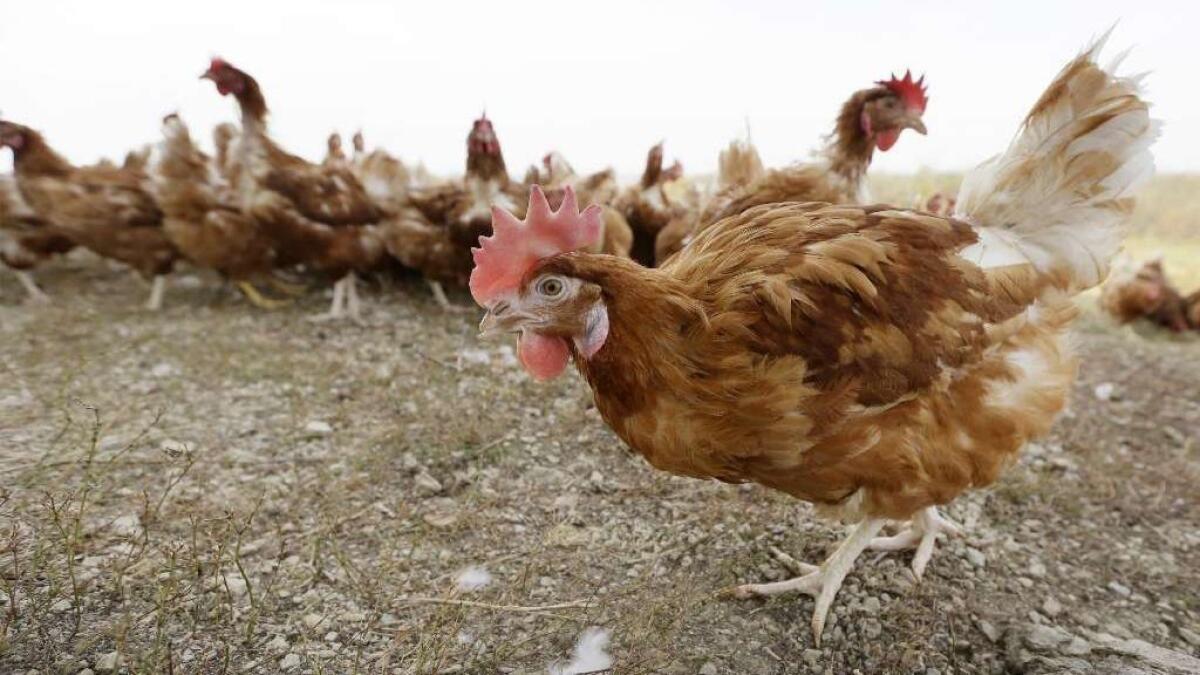Endorsement: Yes on Proposition 12. Let’s get rid of cages for hens for real

What constitutes the proper and ethical treatment of animals has evolved substantially over the last few decades and, inevitably, will continue to change as people better understand the animals that share our homes as pets, roam outdoors as wild creatures, or end up as food on our plates.
A decade ago, California residents voted overwhelmingly to free the state’s millions of egg-laying hens from cages so tiny and cramped that the birds could not stand up, spread their wings or turn around. The measure they approved, Proposition 2, banned California farmers from housing their hens in so-called battery cages, starting in 2015. It also banned cramped crates for gestating pigs and veal calves (although there is little veal or pork production here). The California Legislature later passed a law mandating that out-of-state egg farmers comply with the same requirements on any of their hens laying eggs for sale in this state.
But the ballot measure specified only that hens be given enough space to move around. As a result, most farmers simply refitted their barns with larger colony cages. That was better than the miserable battery cages, but it was not what the measure’s advocates expected nor what hens need for the most humane treatment on a working farm.
Proposition 12, on the ballot this November, requires that eggs being sold in California come from cage-free hens by the beginning of 2022.
Proposition 12, on the ballot this November, requires that eggs being sold in California come from cage-free hens by the beginning of 2022, and it details what that means. It also requires that all veal and pork products sold here come from calves or breeding pigs (or their offspring) that were not confined. This is a humane measure that will move farmers toward better treatment of their animals, and voters should support it.
Dubbed the Prevention of Cruelty to Farm Animals Act, Proposition 12 is sponsored and financed by the Humane Society of the United States, which also backed Proposition 2. In contrast to the earlier initiative, this measure specifies how much barn floor space a hen should get and the types of cage-free layouts that are acceptable. The measure also requires that hens have nest boxes and perches for flying to and from.
These are not luxury amenities for hens. Instead, the rationale is that the extra space and other features are important to hens’ health. For example, the United Egg Producers’ guidelines note that perches allow hens living in large flocks a refuge from other birds and help calm them.
The proposition’s provisions for hens are based on the requirements that the United Egg Producers, a trade association for egg farmers, sets for farmers who want the association’s certification as cage-free operations. They’re also close to the ones for hens set by the nonprofit Humane Farm Animal Care, which seeks to improve the treatment of farm animals.
Enter the Fray: First takes on the news of the minute from L.A. Times Opinion »
Though numerous animal welfare groups support the measure, some oppose it on the grounds that it does not go far enough. And some agriculture industry groups argue that it goes too far too fast. The Assn. of California Egg Farmers argues that farmers have already spent $250 million complying with Proposition 2, and the new measure would force those who have not already gone cage-free — 62% of the state’s egg farmers — to spend even more.
If Proposition 2 is any guide, egg prices won’t go up sharply. According to a Purdue University study of egg prices in California from December 2014 to September 2016, the average price of a dozen eggs rose 22%. But by the fall of 2016, prices were only 9% higher than they were right before the law took effect in 2015. (On a $3 carton of a dozen eggs, that would have been an increase of little more than a quarter.)
The National Pork Producers Council opposes the measure, saying that the mandatory changes in housing conditions would come at significant cost and increase food prices. However, as with hens, there is a growing movement to treat pigs and calves more humanely. There are already nine states (including California) that bar in-state pork producers from using gestation crates for pregnant sows.
It’s heartening that both farmers and buyers acknowledge the importance of improving animal welfare standards. But it’s also important that animal welfare standards be more than suggestions or good-hearted gestures to be undertaken when it’s convenient and withdrawn when it’s not. That’s why it’s important to have a law like Proposition 12 in place. If Proposition 2 moved animal welfare standards one step forward, Proposition 12 moves them an important step further.
Follow the Opinion section on Twitter @latimesopinion or Facebook
More to Read
A cure for the common opinion
Get thought-provoking perspectives with our weekly newsletter.
You may occasionally receive promotional content from the Los Angeles Times.










